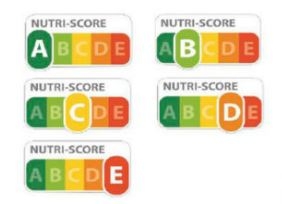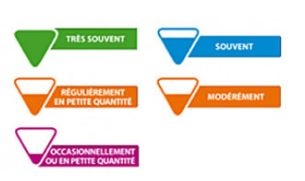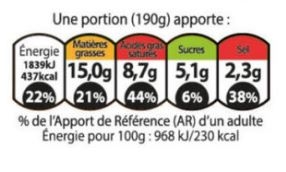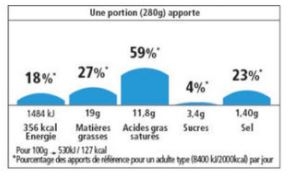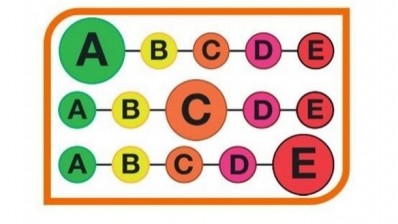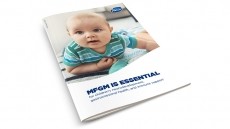Is all fair in love & war, logos & lobbying? France begins nutrition label trial
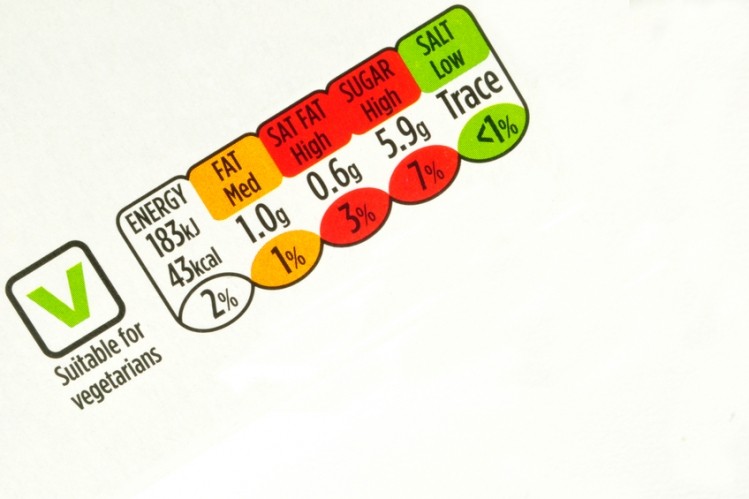
A total of two million labels will be added to products in 40 participating supermarkets: Casino, Carrefour Market and Simply Market, across four regions (Ile-de-France, Normandy, Hauts-de-France and Auvergne-Rhône-Alpes) for 10 weeks.
Pizzas, bakery products, jams, spreads and breads are among the products that will all receive a logo.
The four nutrition logos being tested are: SENS, NutriScore, Nutri-Repère and Traffic Light (see below for a description and visual of each).
A report evaluating the efficacy of the four systems will be produced by year's end at the earliest and submitted to health minister Marisol Touraine, at which point the government will decide which should be adopted as the country’s official nutrition label.
However use of the chosen system will be voluntary as EU regulation prohibits mandatory food labelling in individual member states.
Lobbying
“To test these logos on consumers, an experiment will be carried out under real-life conditions, in other words in several supermarkets," said the Ministry of Social Affairs and Health. "The objective: to determine with accuracy which system in the most efficient in terms of purchasing behaviour, on the basis of a research protocol established by an independent scientific committee.”
The trial period itself is the result of food industry objections to the original five-colour NutriScore.
Two committees have been set up to monitor the efficacy of the four systems, but according to an investigation by reporters from Le Monde (in French), their impartiality is questionable.
The piloting committee is jointly headed by Benoît Vallet and Christian Babusiaux. Babusiaux is also president of FFAS, an industry-financed food and health organisation.
Its scientific committee is made up of 10 members, six of whom have links to Nestlé and Danone, while Le Monde says others have not disclosed their conflicts of interest.
Meanwhile, according to Mediapart, food industry representatives wrote a letter to agriculture minister Stéphane Le Foll urging him to “put an end” to a study being carried out by Hercberg which aims at demonstrating how his five-colour label works.
Hercberg told AFP: “This attempt to interfere with public research is unbelievable and shocking.”
But when questioned by AFP, the retailer association FCD said it had been trying to stop “marketing communications that risked distorting the experiment’s results”.
The candidates
NutriScore
Developed by epidemiologist Serge Hercberg, PNNS in 2014 and was given the backing by the High Council Of Public Health (Haut conseil de la santé publique or HCSP) last year, it would see a food product bear one of the five options above.
It has been decried by the food industry. According to ANIA: “An individual’s balanced diet cannot be reduced to a coloured sticker on a product. These nutritional scoring systems unfairly stigmatise foods as they are based on theoretical calculations taking into account 100 g product without distinguishing actual consumption by consumers.”
But a petition on change.org, which has attracted almost a quarter of a million signatures to date, calls on the French government to adopt this system, claiming it is the most readily understandable and accurate. It cites scientific research which suggests the five-colour NutriScore is easily understood by ‘at risk’ consumers, such as those in low socio-economic groups and the elderly.
SENS
Created by the FCD, the SENS label advises consumers how often they should eat certain products: very often; often; moderately; regularly in small quantities; or occasionally in small quantities.
It has been criticised by FoodWatch. “It has no red light, implying that all foods are more or less healthy. Instead of informing, it suggests consumption frequencies for processed products,” it said in a French language statement.
Traffic Lights
Launched by the UK Food Standards Agency, it has been widely embraced by British manufacturers and retailers but is not loved by all. Other European countries say it unfairly discriminates against certain foods that are high in salt, fat or sugar but that are traditionally eaten in small quantities, such as parmesan, and have questioned its legality in the common EU market.
But it has the backing of by Foodwatch. The watchdog’s information director Ingrid Kragl told FoodNavigator: “We prefer the traffic light system [in the] UK - simple and clear.”
Nutri-Repère
French food lobby ANIA has created its own label, the Nutri-Repère, based on recommended daily allowances and which does away with colours completely. ANIA says it provides the most objective information to consumers.
EU inaction
Meanwhile, the European Union has been considering nutrient profiling systems for more than a decade but it has stalled over appropriate labelling systems; setting the nutrient thresholds for products that make health claims or whether certain foods like high-fat cheese or high-fructose orange juice may be exempt from such regulation.
In April this year, EU-wide nutrient profiles looked even less likely to come to fruition as MEPs voted to do away with them citing problems in implementation and possible market distortions.
